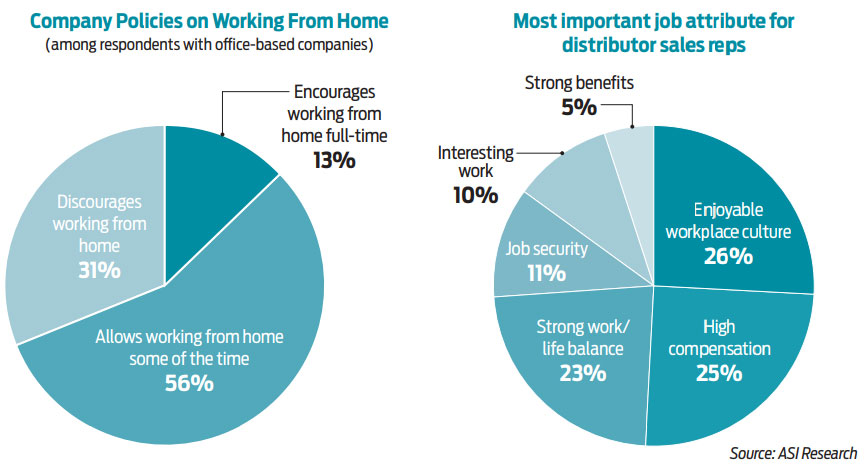Strategy November 20, 2019
Changing Needs of Distributor Sales Reps
Remote work and job flexibility are increasingly desired by sales reps – and distributors have embraced the change.
Who says you can’t go home? Certainly not in today’s workplace, where flexibility and autonomy are prized and companies are increasingly allowing their employees to work away from the office. According to a 2019 TalentLMS report, 66% of companies allow remote work and 16% are fully remote.
GlobalWorkplaceAnalytics.com reported that working at home regularly among the non-self-employed population grew by 140% since 2005, nearly 10 times faster than the rest of the workforce or the self-employed. Working remotely is so desirable that, according to a Gallup report, “flexible scheduling and work-from-home opportunities play a major role in an employee’s decision to take or leave a job.”
Don't Miss: Commission vs. Salary in the Promo Industry
It would be easy to chalk this up to the influence of younger workers who now make up the largest generation of the labor force – indeed, a Deloitte survey of millennials found that 75% of respondents would prefer more opportunities to work remotely. But greater flexibility entices all ages. Consider that in the 2019 Advantages Sales Compensation Survey, sales reps ages 51-60 prioritized work/life balance more than their younger counterparts.

“This has been an ongoing trend for the past several years, driven by improvements in order management technology that allow our account executives to run their business from anywhere with internet connectivity,” says Jim Stutz, executive VP, sales and business development, at Top 40 distributor HALO Branded Solutions (asi/356000).
Sales has always been a profession that encourages time out of the office, and for decades many distributors (and suppliers) have employed reps that live in other parts of the country. But the sweeping technological changes have had a deeper effect. They’ve reduced the need for regional offices, or even the need to step into an office at all. It’s enabled members of other departments besides salespeople to retreat to the confines of their homes on a permanent basis.
With the increase in remote workers and job flexibility, distributors cite a whole host of benefits, from greater customer engagement to broader geographic expansion to increased productivity.
But that doesn’t mean the process is foolproof. Across the entire business spectrum, companies have faced challenges with managing remote employees; in recent years, several large, high-profile companies like Yahoo and Best Buy either ended or scaled back their work-from-home programs in an effort to improve teamwork, collaboration and communication. Feelings of isolation and disengagement among remote workers, once ignored, are now being carefully watched by companies as they transition their workforces.
Leading industry firms say working remotely is ideal for most sales reps, but it takes some effort on a company’s part to make out-of-sight employees feel connected and top of mind. By coupling the right technology with proper avenues of communication, staffers can thrive without feeling left out – a “home” run for everyone.
Work Anywhere
When Boundless (asi/143717) was founded in 2005, the company intended to have staffed offices. “However, they were often empty,” says Pat Barry, executive VP of sales. The Top 40 distributor switched course, and now has just two offices while the vast majority of its 105 reps work remotely. “People like working from home, and technology enables them to do that,” says Barry. “They’re more efficient, there’s no transportation time and there are fewer interruptions.” Geiger (asi/202900) had 26 offices nationwide when Fred E. Snyder, regional VP of sales, Eastern region, began working for the company in the mid-1990s. Now, the Top 40 distributor has less than 10. A greater number of remote salespeople have helped diversify Geiger’s client base. “We’re in areas we never were before, as our reps aren’t limited to a specific office location,” says Snyder, who notes that all of Geiger’s 400-450 reps are independent contractors. Less than 15% of reps do work from an office, if they live within a reasonable distance or if personal circumstances (such as a parent with young children at home) make it preferable to leave the house to get their work done, he explains.
Sales reps at 14 West LLC (asi/197092) have office space at the Waukesha, WI-based company, but are rarely there. Under the distributor’s model, reps have their own account manager who does the sourcing, quoting and order processing, which allows the reps to travel more. “Our reps love being on the road – they’ve become used to spending more time with our clients, and they’ve seen remarkable results with increased revenue,” says President Kevin Scharnek. Of course, some distributors have built their model around a dispersed sales force. Top 40 distributor Kaesar and Blair (K&B, asi/238600), partners with 1,900 independent business owners nationwide, “so a remote sales organization is the only situation possible,” says Gregg Emmer, vice president and chief marketing officer.
Likewise at Top 40 distributor Staples Promotional Products (asi/120601). “All of our salespeople work remotely so they can be close to their customers – they always have,” says Anne McKeough, vice president of global sales. “We have no plans to change that.”
While the very nature of sales lends itself to working remotely, other departments at industry companies have increased their work flexibility. Two years ago, the sales support team at Top 40 distributor American Solutions for Business (ASB, asi/120075) began expanding its remote program. Today, approximately 40% of the 130-person team works offsite. “For a remote program to be successful, you have to set standards,” says Miriah Cassidy, ASB’s executive director, sales support. “We have internet requirements. The staffer needs to have a dedicated workspace and we require they provide a photo of that space.”
Technology Bridges the Distance
Decades ago, a phone and a fax line kept remote reps in touch with their company when they weren’t traveling to the home office. Today, digital technology is the key tool that allows distributors to keep their professionals connected and productive, with the ability to comfortably work together even when they’re geographically distant.
“We’ve created a sense of community in our sales team that doesn’t rely on physical proximity,” says HALO’s Stutz. “We worked very hard in the past couple decades to create a ‘virtual sales office’ where our team can collaborate with their peers across the country in the same way they would collaborate across the hall.”
These tools come in a wide variety of applications, with communication and information at the heart of everything. Where once upon a time reps would pop over to another’s office for a quick question, now there are team collaboration software tools such as Slack, which Lasting Impressions (asi/249926) uses as its main communication hub. “It keeps everyone connected,” says CEO and owner Angela Chryplewicz. “Slack allows us to stay on top of our corporate news, and is a central place where employees can reach out to each other for any kind of help.”
Home Work

As job flexibility and work/life balance take on increasing importance for workers in the promotional products industry, distributors and suppliers have responded: nearly 70% allow their employees to work from home at least some of the time.
HALO has its own collective intelligence tool that allows reps to ask questions (such as where to source a certain item) and share creative ideas. “It’s like having a giant water cooler where one can electronically share conversations about best practices with hundreds of people,” Stutz says.
Tech tools also help with the nitty-gritty of processing orders. HALO’s internal order management tool (Webstar) communicates information to every involved team member. ASB uses MFiles for workflow and document management; the software integrates with the company’s ERP system. CRM tools are essential too; not only do they keep reps connected and informed about projects, deals and timelines, but they help executives monitor productivity of the reps they oversee.
Technology can also serve as a valuable education platform for reps. Cassidy notes that ASB has its own online learning system (titled American University) that allows for companywide training. She adds: “We also have weekly and monthly communications that include video messages from our corporate office to add an extra human touch to topics that are important for our company.”
Overcoming Isolation
In the initial days and weeks for ASB’s newly remote sales support personnel, “people were ecstatic – but then there was a period of mourning when employees missed their desk-mates,” says Cassidy.
It’s an overlooked phenomenon in the era of work/life balance. Yes, stay-at-home workers can ditch the morning commute and eliminate the countless office distractions, but they also must confront feelings of isolation and an absence of community, of simply feeling “left out.” At ASB, the company implemented a number of initiatives to head off those issues. “Our supervisors have weekly one-on-ones with our remote employees – they have up to 45 minutes to talk and it doesn’t even have to be about work,” says Cassidy. ASB provides technology tools, such as Skype and instant messaging, to help people feel connected.
Cassidy also requires the sales support remote employees who work within 60 miles of the home office to come in four times a year to help them feel part of things, and the company offers numerous corporate social and philanthropic events, particularly in the summer, to bring the team together. Annual conferences in the winter and August also help connect the sales reps and home office, and multi end-user shows give associates the ability to meet with suppliers and customers.
“Isolation can happen, but we do a lot to offset that,” says Barry. Boundless offers weekly supplier sessions, peer-to-peer sessions, and regional meetings to help reps get to know each other and feel comfortable.
Lasting Impressions converted to a remote sales force within the last five years, but still has a standing Wednesday meeting in the office that all salespeople attend. “We take care of housekeeping issues, answer questions and bring in supplier reps,” Chryplewicz says. The company also organizes happy hours and other occasions where remote workers can come in and be a part of things, she notes.
Another way to forge connections? Regional industry associations – a tactic that Geiger strongly endorses. “We’re very committed to the success and growth of the industry,” says Snyder, “and participating in these regional groups is a great way for Geiger reps to mingle not only with each other, but also to meet and learn from others in the industry.”
For new employees without a book of business or unfamiliar with the industry and job, Chryplewicz recommends that they spend some time in the office to forge connections, develop good habits and really understand the business and how it runs. “Our new employees usually stay in the office for a couple of months before working remotely full-time,” she says. It’s the fundamental promise of working, with a modern twist: before too long, it’ll be time to go home.
Jean Erickson is a contributing writer for Advantages.
